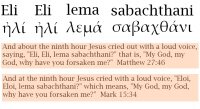 Most scholars believe that Jesus spoke Aramaic with some Hebrew, and possibly Greek. Generally, scholars believe that the towns of Nazareth [
Most scholars believe that Jesus spoke Aramaic with some Hebrew, and possibly Greek. Generally, scholars believe that the towns of Nazareth [This article explores Aramaic reconstructions of phrases in the New Testament as attributed to Jesus (Hebrew-Aramaic ישוע Yeshua, meaning "YHVH is salvation") and New Testament figures.
It is generally accepted that Jesus was born a Jew, and grew up in a Jewish family in Roman-controlled Palestine. For over a half-millennium, the colloquial language for Palestinian Jews was Aramaic, stemming from the Babylonian exile and invading Assyrian empire. For some Jews Hebrew remained a colloquial language, until the end of the 3rd century AD.
More...

